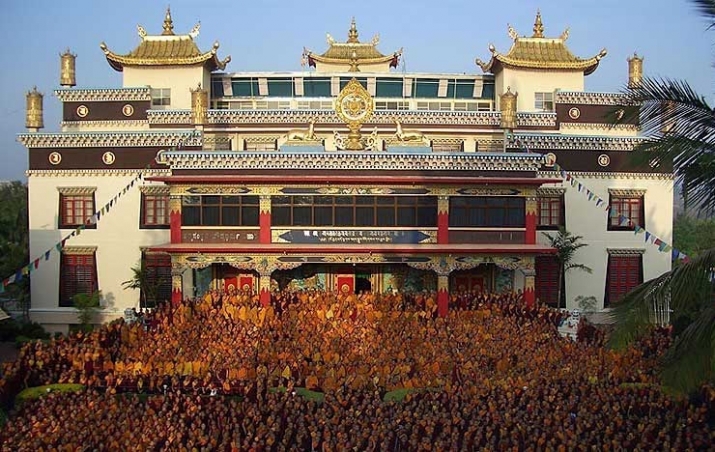NEWS
Indian State of Karnataka Records Dramatic Decline in Buddhist Population
 Namdroling Monastery, established by His Holiness Pema Norbu Rinpoche in India's Karnataka State, is home to nearly 5,000 Buddhist monks and nuns. From namdroling.org
Namdroling Monastery, established by His Holiness Pema Norbu Rinpoche in India's Karnataka State, is home to nearly 5,000 Buddhist monks and nuns. From namdroling.orgData from the 2011 Census of India shows a marked drop of 75 per cent in the Buddhist population of the southwestern Indian state of Karnataka, despite overall growth in India’s Buddhist population, which accounted for about 0.7 per cent of the country’s population of more than 1.2 billion people.
“It truly is surprising,” said Ananda Bante, general secretary of the Maha Bodhi Society in the state capital of Bengaluru (formerly Bangalore). “By the increasing number of programs or congregations, it would seem like the population is rising . . . unfortunately, there is a larger number of ‘paper Buddhists’ who have declared otherwise in the census.” (The Hindu)
The largest declines were recorded in Karnataka’s arid northern districts, where Buddhism grew dramatically in the 1990s through the conversion of Scheduled Castes—the official designation applied to various groups of historically disadvantaged people in India, also commonly known as Dalit, meaning “oppressed.” Scheduled Castes make up about 16.6 per cent of India’s population according to census data. In the districts of Bidar and Kalaburagi, which previously recorded a total of 2,750,000 Buddhists—70 per cent of the state’s Buddhist population—just 48,000 people now identify as Buddhists, according to census data. The previous national census was published in 2001.
P. L. Dharma, head of Buddhist Studies at Mangalore University, said the census methodology inherently excluded members of “lower” castes in areas where caste discrimination existed. “Enumerators talk to gram panchayat [local self-government organizations] members rather with those in [Scheduled Caste] or [Scheduled tribe] colonies,” he said. “Caste of the family is equated as Hinduism, rather than Buddhism.” (The Hindu)
Vaijanath Suryavanshi, a Bidar-based Dalit leader, said the popularity of Buddhism remained tied to the dissipating Dalit movement in these regions. A popular social movement during the 1990s triggered a rise in conversions to Buddhism. “By 2004, the movement was divided. The [Bahujan Samaj Party representing the Scheduled Castes] faltered and the oppressed castes were appropriated by all parties,” Suryavanshi said. “When misinformation spread of neo-Buddhists being denied caste-reservation,* there was no movement strong enough to counter this, unlike in Maharashtra.” (The Hindu)
The neighboring state of Maharashtra, which is home to 73 per cent of India’s Buddhists, posted an increase of 600,000 in its Buddhist population.
Mavalli Shankar, state secretary for the Dalit Sangharsh Samiti activist movement, agreed. “The movement continues to work for social justice, but when it comes to following Dr. B. R. Ambedkar’s call for Buddhism there is a deep schism,” he said. “The fear of losing political space, or Hindu votes, is enough to scuttle the call.” (The Hindu)
Dr. Bhimrao Ramji Ambedkar (1891–56) was an Indian jurist, economist, and politician, and a prolific scholar and social reformer. He inspired the modern Buddhist movement in India and campaigned against the social discrimination towards women and India’s “untouchable” Dalit caste. He was the principal architect of India’s first constitution and in 1955 founded the Buddhist Society of India.
*Caste-based reservation is a form of quota-based affirmative action to increase opportunities for members of Scheduled Castes and Scheduled tribes in education, scholarships, and employment.
See more
Buddhist population down by 75 per cent in Karnataka (The Hindu)
Population Enumeration Data (Final Population) (Census of India)
Indian State of Maharashtra Mulls Separate Law for Buddhist Marriages (Buddhistdoor Global)














